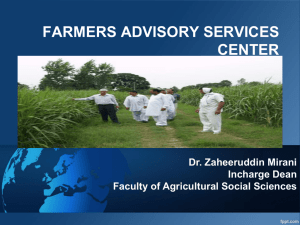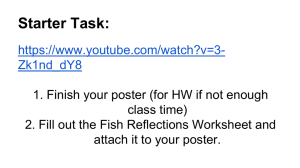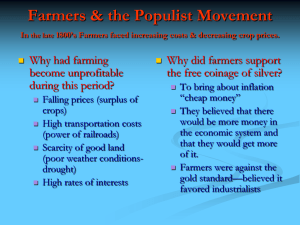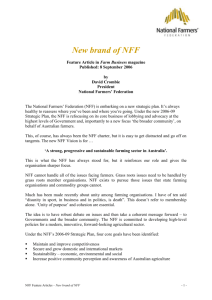View /
advertisement
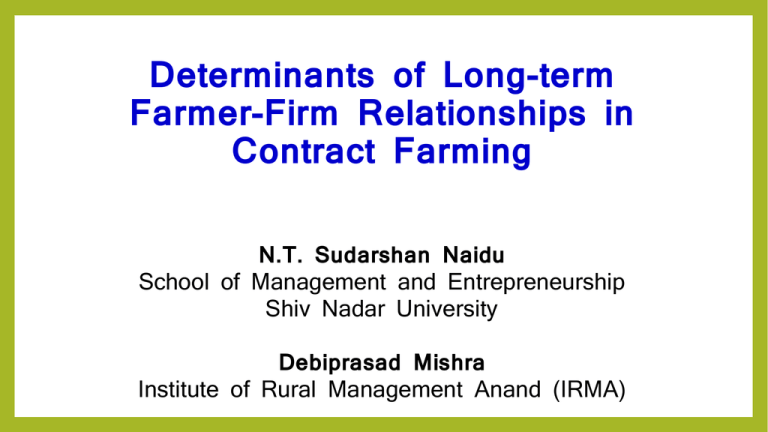
Determinants of Long-term Farmer-Firm Relationships in Contract Farming N.T. Sudarshan Naidu School of Management and Entrepreneurship Shiv Nadar University Debiprasad Mishra Institute of Rural Management Anand (IRMA) Contents • Rationale for contract farming • Problems in contract farming • Research questions • Methodology • Results • Conclusion Rationale for Contract Farming • Food processing • Requirement • Strategies and seed production firms for procurement of agricultural produce fall on a continuum (Key & Runsten, 1999) Spot Market Contract Farming Vertical Integration Contract Farming • “a pre-negotiated agreement between a producer and a buyer that may include any one or all of the following: market specification, resource provision and production management” • Agricultural • Vegetables, fruits, aromatic crops, poultry, safflower • Firms • produce under contract farming: involved in contract farming: Pepsico, ITC, Marico, Monsanto, Safal, HUL, Global Green (Thapar’s), Rallies, Namdharis, Suguna, Nijjer, Literature on Contract Farming Advantages • increase in farmers’ income (Minot, 1986; Singh & Asokan, 2004; Tripati et al, 2005; Miyata, 2007) Insulate farmers from volatility of market risk • Access to speciliazed inputs (Minot, 1986; Key & Runsten, 1999; Singh & Asokan, 2005; • Begum, 2005) Limitations • Indirectly secure effective control over farmers’ land and labour leaving them with only formal title to both • Impose technological, managerial and marketing direction on farmers (Clapp, 1994) Literature on Contract Farming Limited Studies on Contract Relationships • Explored the role of transaction specific assets (TSA) and opportunism (Asokan, 2007) • No studies have explored the role of other perspectives of relationship building In-depth study was required to understand buyer-seller relationships in contract farming Problems in Contract Farming • Mixed experience with contract farming. • Problems due to price, produce quality, cross-selling, non-procurement (Jaffee,1994; Watts, 1994; Singh, 2004; Asokan, 2007; Imbruce 2008 ) • Problems are also related to practices followed Main problem for firms: • Continuity of • Why to continue? • Opportunism • relationship (cross-selling) Inward & outward Managing relationship Research Questions • How do buyers in contract farming build and manage relationships with farmers? • Why do some relationships sustain over long term? Methodology • Case study research was used • Knowledge base on the topic is scarce (Bonoma, 1985; Easton, 2010) • In-depth understanding of complex phenomenon (Remenyi et al., 2002; Yin, 2009) • Mostly preferred to address ‘why’ and ‘how’ questions (Brown, 1998; Yin, 2009) • little or no control over the events and the focus is on contemporary phenomenon within a real-life context (Yin, 2009) • Pilot study • Study Area • Karnataka – pioneer in contract farming, accessibility, convenience and language Multiple case design • Findings from multiple cases were considered as more compelling and the overall study regarded as robust (Herriott & Forestone, 1983; Yin, 2009) • Short duration and high and low price fluctuating crops • Availability of alternate channels 1. 2. 3. 4. • Case Namdhari Farm Fresh (NFF): NFF: ABC: Namdhari Seeds (NS): study protocol developed Baby corn Tomato Tomato Tomato seeds • Data collection • Interviews with farmers and officials • Observation • Records • Total villages : 24 • Total in-depth interviews: 61(Farmers interviewed:38; officials interviewed: 23) • Interacted with another 20 farmers Results Namdhari Seeds Pvt Ltd. • One of the largest seed companies, started in 1985 • One of the largest contract seed producers • Breeding, production and distribution of seeds Namdhari Farm Fresh Pvt Ltd. • Started in 2000, near Bengaluru • Handle average 17 T/day vegetables (without baby corn) • Handle 50 T/day of baby corn • About 1500 contract farmers in Bidadi area alone ABC • Subsidiary of the public sector board • Started contract production of tomato in 2008 with about 350 farmers NFF Baby Corn NFF Tomato NS Tomato Ranibennur and Bidabi and Ramanagaram Geographical area Byadagi Taluks (350 (40-60 km from B’ lore) km from B’lore ABC Tomato Gauribidanur (70 km from B’lore) Opportunities for alternate crops Yes Yes Yes Presence of other contract firms No Many No Available No spot market for seeds Available Alternate markets Selection of Farmers Preference Verify NFF NS ABC Old farmers Old farmers Old farmers Small farmers -- -- No of members in the family No of members in the family Number of animals Sincere Sincere Soil type, irrigation Soil type, irrigation Land records, irrigation Yes No History of cropping system Background check Yes One way of controlling opportunism was to select partners who were less opportunistically inclined or inherently cooperative (Wathne & Heide, 2000) Reasons for Entering into Contract Farming • NFF Baby corn: For guaranteed (fixed) price throughout the year • NFF Tomato: Expectation of high profit. Lucky crop • ABC Tomato: Dual purpose of receiving guaranteed returns and high profit • NS Tomato seeds: To earn more profits • Farmers enter into contract farming mainly to earn more than they were previously earning or to get guaranteed fixed price and avoid market risks • Other reasons: convenience, input provision Role of Price NFF Baby Corn NFF Tomato NS Tomato Seeds ABC Tomato Unit price Fixed price Changed the policy. Market linked Price range Fixed but changed sometimes Diversion Very Low Low Very low/ nil High Overall perceived profit compared to other crops High (corn, fodder, milk); round the year High with risk High High Overall perceived profit compared to supplying to rival firms No rival firms No rival firms High No rival firms Profitability by supplying to local markets Low, risky Low Low High Farmers will not divert the produce to open market as long as the differential profit that could be earned by selling in open market, rather than supplying to contract firm, is less than marketing costs Farmers continue production of contract crop as long as the overall profit obtained from contract crop is at least equal to the profit obtained by cultivating other crops with similar resources Farmers continue the relationship with contract firm as long as the overall profit offered by the firm is at least equal to that offered by rival firms Additional benefits NFF Baby Corn NFF Tomato NS Tomato ABC Tomato Compensation Yes Yes Yes No Advances Yes Yes Yes No Advance by other firms -- -- No -- Remarks Welfare Activities Jobs Social Service Activities Social Service No service Comparison Level of Alternatives (CLalt ) • CLalt is the overall benefit (social and economic) available from the best possible alternative exchange relationship (Thibaut and Kelley, 1959; Lambe, Wittmann and Spekman 2001) • Proposition: Farmers continue the relationship with contract firm as long as the overall outcome from the relationship is at least equal to CLalt • Scope to refine the concept Comparative Level of Alternate Crops (CLaltcrop) • CLalt-crop helps to determine whether a farmer continues to grow the same crop under contract or change the crop • CLalt-crop is defined as the overall outcome available from cultivating best possible alternative crop • Proposition: Farmers continue cultivating contract crop as long as the overall outcomes from contract crop exceed CLalt-crop Services Offered • Inputs supply: timing, quality, regularity • Extension • Inputs service: timing, quality, frequency quality influence yield and company’s reputation NFF Baby Corn NFF Tomato NS Tomato Seed ABC Tomato Seeds / seedling quality Good quality, subsided. Hub & spoke model Good, subsided Good Pesticides No provision Yes, superior quality Yes Kit provided Regularity of pesticides -- Yes Yes During starting Field staff visit 2-3 days 1-2 Daily; Record the status; Create Pressure 4-5 days Advances If required If required If required No provision Quality of extension service Good Good V. good Not up to expectations Remarks Satisfied Satisfied Highly satisfied Not up to expectations • Proposition: Farmers trust the contract firm if they perceive the services provided by the firm as good or superior. • Positive outcomes from the relationship over a period of time increases trust on its partner (Lambe, Whittmann & Spekman, 2001) • Proposition: Service quality offered by contract firms has positive influence on continuity of relationship by farmer. Practices Followed • Payment: Timing & frequency • Weighing: fairness and transparency • Quality assessment: fairness and transparency • Fairness / honesty in practices NFF Baby Corn NFF Tomato NS Tomato Seed ABC Tomato Weighing Fair and transparent. Farmers weigh. Procure excess production Fair and transparent Not transparent Payment Once on 15 days deposit to bank accounts After GoT, usually 3 months Initially no regularity Quality Assessment In pack house. Fair At headquarters. Fair Not graded Farmers perception Fair and can be trusted Fair and can be trusted Do not trust • Proposition: Farmers trust the firms if they perceive the practices followed by firms as fair • Proposition: Fairness in practices followed by firms has positive influence on farmers’ relationship continuity • ‘Procedural et al, 1995) fairness’ create trust and expectation of continuity (Kumar Role of Field Staff NFF Interaction Farmers perception NS ABC Frequent. Half day in field Frequent. Stayed in villages Not frequent Formed personal bonds. Attend functions Formed personal bonds. Attend functions No personal bond Respected Respected Helpful, honest and trustworthy Helpful, honest and trustworthy Biased Yield increase attributed to field staff Role of salesperson - informer, persuader, problem solver and value creator (Wotruba, 1991) Social Service Activities NS and NFF • Donations for construction or repair of school buildings, temples • Scholarships to poor students • Construction of houses to employees • Help during village festivals, marriages etc • Have good relationships with • Help in avoiding problems the community & leaders ABC: Not involved in any welfare activities Developing Relationships with farmers • Complex • Attend process to farmers’ need on time • Maintain fairness, provide better services & help in improving crop yield and returns • Safeguard • Regular • Do the interests of farmers interaction / accessibility not make false promises • Show your commitment and farmers will reciprocate • Farmers should not feel problems in relationships Conclusion • Both unit price and overall outcome play important role • Selection was considered as first step • Monitoring • CLalt was not very effective determines farmer’s continuation of relationship with the firm • CLalt-crop helps in determining the continuation of contract crop by farmers • Relationships can be improved by offering services timely, maintaining fairness in practices, frequent interaction and helping in emergencies • Boundary level staff can make or break relationships Thanks
